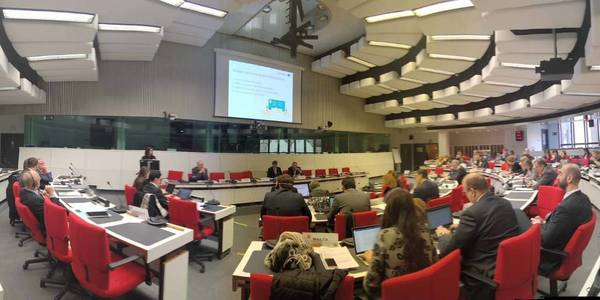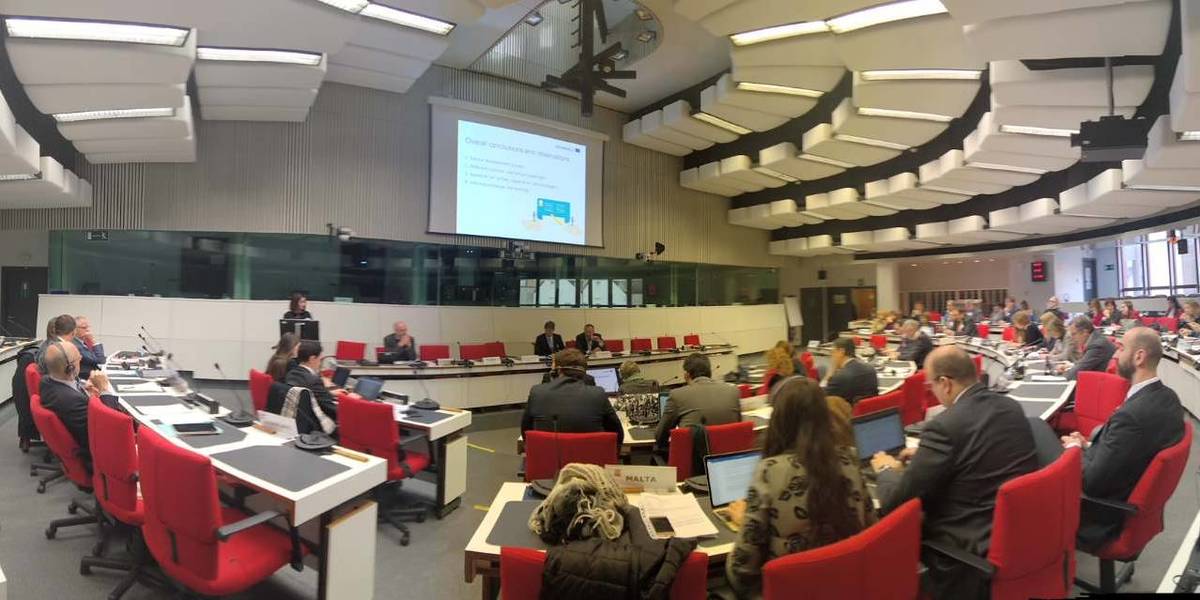Meeting of High-Level Group of EU Macro-Regional Strategies held in Brussels
Last week, the High Level Group of the EU Macro-Regional Strategies had a meeting in Brussels. The meeting, initiated by the Directorate-General for Regional and Urban Policy of the European Commission, envisages not only participation of the member-states of macro-regional strategies (MRS), but also representatives of all EU countries and key EU institutions.
Based upon the previous experience, the meeting aimed to unite all four MRSs to formulate conclusions on the effectiveness of strategies and consideration of topical issues regarding EU regional policy after 2020.
At the meeting, Jean-Pierre Halkin, Head of Unit, Macro-Regions and Territorial Co-operation - Transnational and Interregional Co-operation at European Commission, suggested to revise the MRS management structure to simplify it, clearly define the role of stakeholders and strengthen institutional support at the regional and local levels. In general, capacity building concerns not only the development and implementation of EU policies, but also the harmonisation of the financial component.
According to the experts of the European Commission, the funding mechanism should be simplified as well. In particular, it concerns improving the link between funds and financial instruments of the EU and the countries belonging to the macro-regional strategies. This means developing new project formats, creating clusters and platforms for sharing experience, strengthening communication and implementing mechanisms for regional adaptation. An important aspect is the synchronisation of the EU financial programmes with projects in a transnational context, which are now more focused on the national level. It should be noted that the European Commission has started to prepare a report on the implementation of the EU macro-regional strategies for 2018. Unlike the previous one, the upcoming report will focus on a more practical approach and share best practices in implementing strategies.
Representatives from the European Parliament and the Committee of the Regions made political recommendations and conclusions on the MRS implementation.
Mr Andrea Cozzolino, Member of the European Parliament, and Mr Petr Osvald, chair of the Commission COTER of the Committee of the Regions, emphasised that macro-regional strategies are important, especially in the current political context, since they strengthen regional integration by attracting non-EU countries. According to the experts, the most significant element of such integrated development outside the EU is an active involvement of representatives of local and regional authorities in the dialogue. Attention was drawn to the lack of macro-regional strategies in the priorities of sectoral policies and its funding programmes, as this is an important aspect for synchronising project work. A more effective implementation of subsidiarity principle in Europe, an essential element of which is the involvement of MRS implementors and civil society actors in the process of strategic programme development, are also on the agenda.
The EU regional policy after 2020 was among the most urgent topics this year. At the moment, the European Commission is preparing a framework programme for the sustainable development of the regional policy for a period of 2020+. The priorities, goals and main objectives of the programme include enhancement of competitiveness and synchronisation with the EU, as well as improvement of the Single Market. It has been repeatedly emphasised that the EU regional policy, as the main investment programme, should remain a stable and reliable instrument focusing on the future development of regions. A successful regional policy should be based on a long-term strategy with an effective coordination structure at the European, national and regional levels. The creation of a network involving partners, business representatives, local communities and other stakeholders in cooperation at different levels is equally important.
Within the framework of the meeting, representatives of the presidency countries of each MRS announced plans to implement presidential strategies. This year, Bulgaria holds the presidency of the EU Strategy for the Danube Region (EUSDR). In 2018, Bulgaria will focus on the development of tourism, cultural and historical heritage of the Danube region, and will continue to work on improving the governance and co-ordination of the EUSDR. It should be mentioned that according to the rules of procedure, the presidency acts on a rotating basis. This year, Ukraine expressed its initiative to preside the EUSDR in 2021.
For Ukraine, this event is one of the few sites in the EU, where it works as an equal participant, along with all EU member states. Such platforms play an important role for the European integration and consideration of issues that concern not only EU-Ukraine relations, but also 2020+ issues.

Tags:
regional development cross-border cooperation
Source:
Український інститут міжнародної політики

19 December 2025
Locally-led Recovery Planning: How Polaris Strategic Sessions Work
Locally-led Recovery Planning: How Polaris...
The Polaris Programme continues to provide systematic support to hromadas under its Locally-led Recovery sphere. In...
19 December 2025
Бориславська міська рада затвердила новий Статут громади
Бориславська міська рада затвердила новий...
Сьогодні, 18 грудня, Бориславська міська рада прийняла історичне рішення, затвердивши Статут Бориславської міської...
19 December 2025
Public Finance for Children (PF4C) Ukraine's State Budget 2026 Overview
Public Finance for Children (PF4C) Ukraine's...
UNICEF Ukraine has prepared a brief overview of Ukraine’s State Budget for 2026, with a focus on financing for social...
19 December 2025
Питання релокації пожежно-рятувальних...
“Велика війна” зумовлює не завжди очевидні виклики для територіальних громад. Хоча законодавчі органи активно...